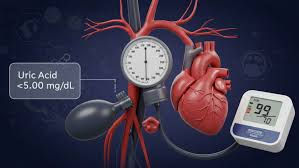High levels of uric acid cause Hypertension
- Malcolm clark
- Jun 24, 2025
- 2 min read

High uric acid levels (hyperuricemia) are linked to hypertension, with research showing a clear association. Here’s some supporting evidence:
How High Uric Acid Contributes to Hypertension
Vascular Effects:
Uric acid can cause endothelial dysfunction (The endothelium is the thin layer of cells that lines the interior surface of blood vessels and lymphatic vessels. It acts as a crucial interface between the blood and the surrounding tissues, playing a vital role in maintaining vascular health and regulating various bodily functions), reducing nitric oxide availability, which impairs blood vessel relaxation and increases blood pressure.
It promotes inflammation and oxidative stress, stiffening arteries and raising vascular resistance.
Kidney Impact:
Hyperuricemia can damage kidneys, reducing their ability to regulate sodium and fluid balance, which contributes to higher blood pressure.
A 2017 study in Hypertension found that elevated uric acid levels impair renal blood flow, a key factor in hypertension.
Renin-Angiotensin System Activation:
Uric acid stimulates the renin-angiotensin-aldosterone system, which constricts blood vessels and retains sodium, elevating blood pressure.
Insulin Resistance:
High uric acid is linked to insulin resistance (also tied to high sugar intake, as noted in your prior question), which can increase blood pressure by affecting sodium retention and vascular tone.
Implications for Gout Patients
Since gout is caused by hyperuricemia, those with gout are at higher risk for hypertension. Managing uric acid through diet and lifestyle (hydration, weight control) can help mitigate both conditions.
Practical Steps
· Diet: To reduce uric acid levels and manage gout, certain foods and supplements can help lower uric acid production, improve its excretion, or reduce inflammation.
Foods That Help Reduce Uric Acid
Cherries and Berries:
Why: Cherries (especially tart cherries) contain anthocyanins, antioxidants that reduce inflammation and lower uric acid levels. A 2012 study in Arthritis & Rheumatology found that cherry consumption reduced gout attacks by 35%.
Low-Purine Vegetables:
Why: Most vegetables are low in purines and support kidney function to excrete uric acid.
Examples: Leafy greens (spinach, kale), bell peppers, cucumber, and carrots.
Tip: Avoid high-purine veggies like mushrooms, asparagus, and cauliflower in excess.
Whole Grains:
Why: Complex carbs like oats, quinoa, and brown rice stabilize insulin levels, aiding uric acid excretion.
How: Replace refined carbs (white bread, pasta) with whole grains to avoid insulin spikes.
Low-Fat Dairy:
Why: Skim milk and low-fat yogurt contain proteins that promote uric acid excretion. A 2010 study in The New England Journal of Medicine linked dairy intake to lower gout risk.
How: Include 1–2 servings daily, like a glass of skim milk or plain yogurt.
Citrus Fruits:
Why: High in vitamin C and citric acid, which may help dissolve uric acid crystals and enhance excretion.
Examples: Oranges, lemons, limes, and grapefruit.
Nuts and Seeds:
Why: Low in purines and rich in healthy fats, they support overall health without raising uric acid.
Examples: Almonds, walnuts, flaxseeds, and chia seeds.
Water:
Why: Hydration is critical for flushing uric acid via urine.




Comments